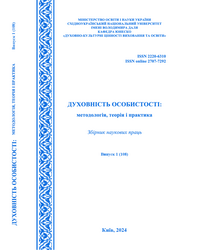INFORMATION AND TECHNOLOGICAL TOOLS IN THE PROFESSIONAL TRAINING OF FUTURE PHILOLOGISTS
DOI:
https://doi.org/10.33216/2220-6310/2024-108-1-99-108Keywords:
professional training, individual learning strategies, information technologies, students of philology majorsAbstract
Modern society emphasizes the need for the formation of independent, proactive and responsible specialists who are highly qualified and able to work effectively in social, industrial and economic spheres. This requires the development of personal qualities and creative abilities of a person, as well as the ability to independently acquire new knowledge and solve various tasks. For this reason, the education system is being reformed in order to train competent individuals who are able to make informed decisions in educational and professionally significant situations.
The relevance of the highlighted issues emphasizes the need for the development of individual learning strategies with the help of information technologies and highlights the psychological and pedagogical aspects of increasing the effectiveness of the professional training of students of philology majors. The use of modern technologies during foreign language classes creates favorable conditions for the diverse use of various forms of work, promotes the development of students' creative activity and activates their attention. This helps to increase the creative and motivational potential of students.
In modern educational practice, the integration of the latest technologies and electronic learning transforms the use of information technologies into an effective and affordable means of training future philologists. The Internet has become an important space not only for information exchange, but also for education and work. This integration of technologies into the educational process opens up many new opportunities for pupils and students in learning languages and developing their skills. it is important to investigate which specific competencies are key for students of philology majors and how they can be developed through the educational process. This may include the study of language skills, analytical thinking, critical thinking, cultural competence and other aspects that are important for a successful professional activity in the field of philology.
Such an in-depth analysis of learning technologies and methods aimed at developing the competences of students of philological majors will allow to more effectively solve problems related to the formation of individual learning strategies in this area.

